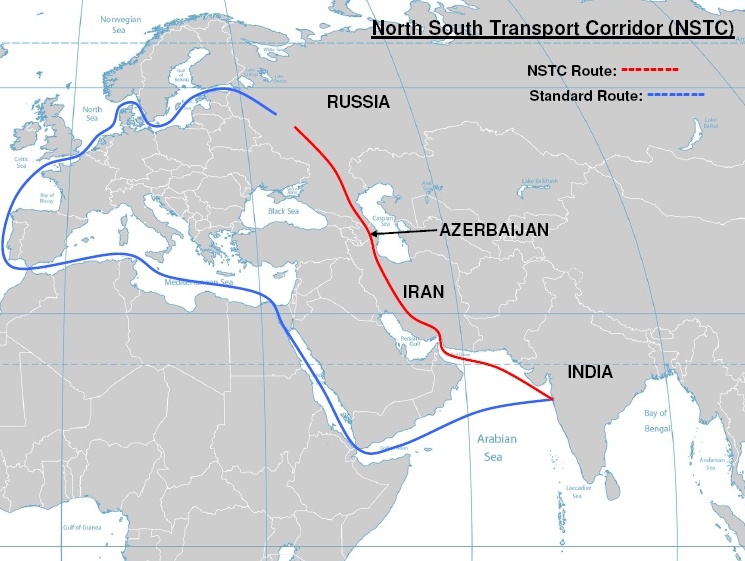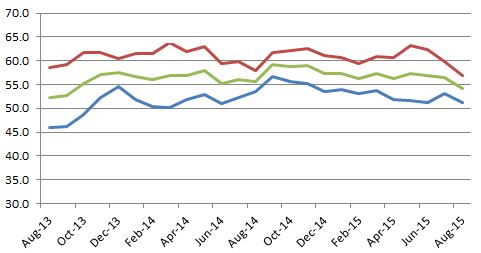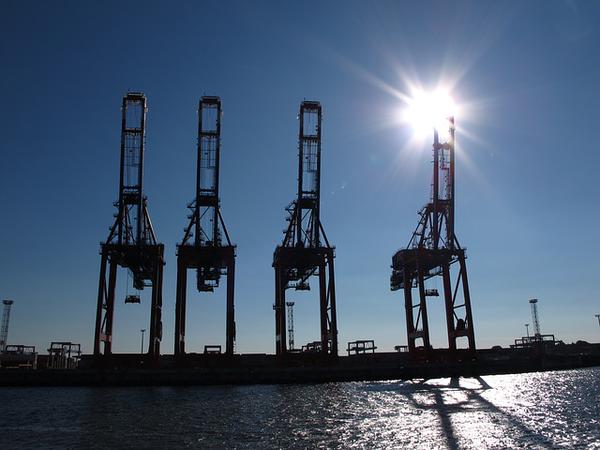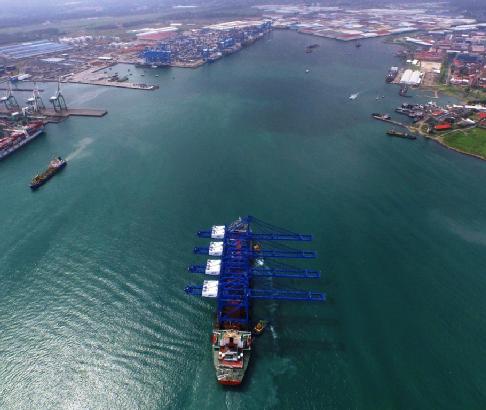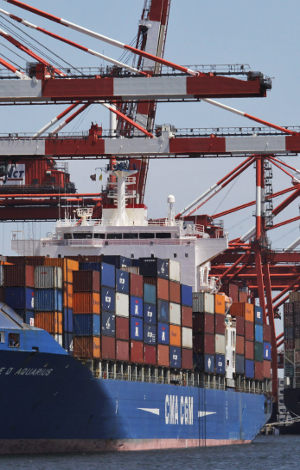Britain faces €2bn EU bill for Chinese customs fraud
Britain risks a €2bn bill from Brussels for failure to crack down on customs fraud by Chinese clothing importers. OLAF, the EU’s anti-fraud office, said on Wednesday that Chinese importers had escaped customs duty by declaring textiles and clothes to be worth a tiny fraction of their true value. The authority said much of the activity was organised by international criminal gangs and accused the UK of failing to act on repeated warnings. Results of the three-year investigation have been handed to the European Commission to decide whether to pursue the UK for lost customs duties, one of the main sources of revenue for the EU budget. Any move to do so would set up a bruising battle with London, which already faces highly sensitive talks with Brussels on the cost of its Brexit divorce settlement with the EU.
Reported by Financial Times 09/03/2017
Reported by Financial Times 09/03/2017
China’s “One Belt, One Road” project provides opportunities and rules
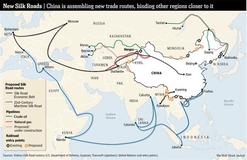
The recent news that a direct rail freight service had arrived in Barking, East London, from China via the ancient ‘Silk Road’, generated a flurry of speculation about the potential of this new route. However, the truth and implications of this are more complex and potentially far-reaching.
China has always been interested in the ancient trading routes heading west towards Europe. As it seeks to develop its regions in the west, much of this investment has gone into the province of XinJiang. There has been a massive amount of investment into infrastructure and the extractive industries, but this has been accelerated because of a specific government policy.
In the autumn of 2013, the Chinese President Xi Jinping announced the ‘One Belt, One Road’ project. This is both a strategy and framework to revitalise the ancient trading routes from the east to the west. The scale is massive and the estimated total value of the project will be in the region of US$4 trillion and ultimately involves up to 65 countries along four major corridors.
This project is now spilling over into the adjacent countries of Central Asia (Kyrgyzstan, Tajikistan, Kazakhstan, etc.). A lot of investment and construction has gone into refurbishing and re-energising the old trade routes that criss-cross the region. Obviously opening up these routes into Eurasia and European markets is a natural extension.
However, this is not just about the flow from east to west, there are several pathways, forming a network of trade lanes across the region. The goal is also to boost regional trade and establish an economic zone supported by China. Unlike the existing China – Europe Maritime trade flows from the seaports of the coast, China is investing in trade routes over which it can establish a reasonable amount of direct control. It does this by managing (controlling) how these investments are financed.
Almost all of their investments in central Asia are in the form of Yuan loans and come with strict conditions. The primary one is for the borrowers to avoid acting in a manner that is contrary to the views of Beijing. In return, roads, rail and energy pipelines are constructed or refurbished and modernised. Export deals for energy from the oil and gas rich nations into China are agreed alongside the construction of pipelines and power grids. Most of this is directed via Xinjiang, helping to develop the region in line with the central government development goals.
Logistics operators with expertise in these areas should review these developments as opportunities, as in some countries the lack of logistics expertise is holding back the exploitation of the revitalised routes. But, as with any investments in areas with ‘interesting’ political structures and overtones, one should not be naive in why this is happening. China is quite clear that investment in new projects can be stopped or loans renegotiated on less favourable terms, if the recipients appear to be operating contrary to the interests of China. This is subtly different to trade loans and investments from other pan global institutions such as the IMF, UN, EU and sovereign countries such as the USA.
Alongside the colossal investments the ‘one belt, one road’ programme, the maritime Silk Road trade routes are also the subject of intense investment. Not least in terms of the dramatic expansion of the Chinese navy (PLA(N)) in both size and capability. Informed observers believe that by 2025 they will match, if not exceed the size, scope and capability of the U.S. Navy – currently the world’s largest. Western governments have consistently underestimated the rate of development of the PLA (N) and while they claim to be doing this to protect existing trade routes, it is obvious that other motives are at work.
On a more positive note, the expansion of the Chinese Navy has helped to assist and augment the humanitarian and anti-piracy efforts in the Indian ocean, the Middle East and the Horn of Africa, which is to be welcomed. They have also invested heavily in the development of ports along the route for trade as well as naval support.
In summary, China is expanding trade routes via the development of the ancient pathways and networks of the past. It is also establishing a maritime footprint to support trade flows back into China. It is doing this via direct investment and views these developments as critical parts of the strategy to develop western China and trade into Eurasia, the Middle East and Europe.
One cautionary note though. Information flows will be key to all of these things, and as most people are aware, China has interesting views about the free flow of data and information. Unless they accept that transparency of information is necessary for efficient and effective trade flows, these new roots may struggle to reach their potential.
Source: Transport Intelligence, March 6, 2017
China has always been interested in the ancient trading routes heading west towards Europe. As it seeks to develop its regions in the west, much of this investment has gone into the province of XinJiang. There has been a massive amount of investment into infrastructure and the extractive industries, but this has been accelerated because of a specific government policy.
In the autumn of 2013, the Chinese President Xi Jinping announced the ‘One Belt, One Road’ project. This is both a strategy and framework to revitalise the ancient trading routes from the east to the west. The scale is massive and the estimated total value of the project will be in the region of US$4 trillion and ultimately involves up to 65 countries along four major corridors.
This project is now spilling over into the adjacent countries of Central Asia (Kyrgyzstan, Tajikistan, Kazakhstan, etc.). A lot of investment and construction has gone into refurbishing and re-energising the old trade routes that criss-cross the region. Obviously opening up these routes into Eurasia and European markets is a natural extension.
However, this is not just about the flow from east to west, there are several pathways, forming a network of trade lanes across the region. The goal is also to boost regional trade and establish an economic zone supported by China. Unlike the existing China – Europe Maritime trade flows from the seaports of the coast, China is investing in trade routes over which it can establish a reasonable amount of direct control. It does this by managing (controlling) how these investments are financed.
Almost all of their investments in central Asia are in the form of Yuan loans and come with strict conditions. The primary one is for the borrowers to avoid acting in a manner that is contrary to the views of Beijing. In return, roads, rail and energy pipelines are constructed or refurbished and modernised. Export deals for energy from the oil and gas rich nations into China are agreed alongside the construction of pipelines and power grids. Most of this is directed via Xinjiang, helping to develop the region in line with the central government development goals.
Logistics operators with expertise in these areas should review these developments as opportunities, as in some countries the lack of logistics expertise is holding back the exploitation of the revitalised routes. But, as with any investments in areas with ‘interesting’ political structures and overtones, one should not be naive in why this is happening. China is quite clear that investment in new projects can be stopped or loans renegotiated on less favourable terms, if the recipients appear to be operating contrary to the interests of China. This is subtly different to trade loans and investments from other pan global institutions such as the IMF, UN, EU and sovereign countries such as the USA.
Alongside the colossal investments the ‘one belt, one road’ programme, the maritime Silk Road trade routes are also the subject of intense investment. Not least in terms of the dramatic expansion of the Chinese navy (PLA(N)) in both size and capability. Informed observers believe that by 2025 they will match, if not exceed the size, scope and capability of the U.S. Navy – currently the world’s largest. Western governments have consistently underestimated the rate of development of the PLA (N) and while they claim to be doing this to protect existing trade routes, it is obvious that other motives are at work.
On a more positive note, the expansion of the Chinese Navy has helped to assist and augment the humanitarian and anti-piracy efforts in the Indian ocean, the Middle East and the Horn of Africa, which is to be welcomed. They have also invested heavily in the development of ports along the route for trade as well as naval support.
In summary, China is expanding trade routes via the development of the ancient pathways and networks of the past. It is also establishing a maritime footprint to support trade flows back into China. It is doing this via direct investment and views these developments as critical parts of the strategy to develop western China and trade into Eurasia, the Middle East and Europe.
One cautionary note though. Information flows will be key to all of these things, and as most people are aware, China has interesting views about the free flow of data and information. Unless they accept that transparency of information is necessary for efficient and effective trade flows, these new roots may struggle to reach their potential.
Source: Transport Intelligence, March 6, 2017
Digital Journey or Customer Journey?

A central facet of digital marketing is the customer journey. This journey takes an anonymous visitor (either online or in a physical location) to becoming an identified prospect to the purchase transaction, and then onto becoming a happy customer (who might buy more) or an unhappy one (who needs some kind of special treatment to become happy again).
Simple enough – but for all you marketers out there who’ve been at this for a while, you’ll notice that there’s nothing particularly new about the notion of a customer journey. In fact, customer journeys actually date back to the dawn of commerce, thousands of years ago.
The central notion of a customer journey is essentially that the purchase transaction is only a part of a merchant’s hopefully lifelong relationship with their customer – and furthermore, that relationship is important to the performance of the merchant’s business overall.
It doesn’t matter whether you’re selling fish at an open air market, running a general store in the Old West, or hawking your wares online. Building relationships with customers that begin before they buy anything and extend well after their first purchase are the key to maximizing the value of each customer to your business, and thus the key to profitability overall.
Why, then, is there so much talk about customer journeys now, as though the rise of digital was somehow responsible for the entire notion? It seems that digital discussions have co-opted the customer journey entirely – leading to the concept of a digital journey. Does a digital journey even make sense?
Clearing Up the ‘Customer Digital Journey’
There’s no question that there’s substantial confusion over the notion of a ‘customer digital journey.’ This notion is problematic, because there is really only the customer journey, which includes some digital touchpoints and some person-to-person touchpoints.
Furthermore, if you use the phrase ‘digital journey’ then you open yourself up to the question as to whether there’s a ‘non-digital journey’ and whether customers are now on two separate journeys.
This notion of two separate journeys is as silly as a mid-twentieth century department store asking whether customers ordering from a catalog vs. coming into the store to make a purchase were on separate journeys. Perish the thought!
True, catalog vs. in-store were separate channels, but merchants realized that one customer might use the catalog one day and come into the store another – and yet, there would still only be one relationship between merchant and customer regardless.
Adding Digital to the Customer Journey
Today’s customers have a profound variety of choices regarding the various touchpoints they might use to interact with a merchant (or any company, for that matter) – and yet, each interaction is nevertheless but a single ‘moment’ on that customer’s unique journey with the company.
For every step in this journey, each customer requires interactions specific to that step. However, in many cases, the merchant in question either has no idea where particular individuals are in their journey, or even worse, does know where they are but disregards that information in its interactions.
Take retargeting, for example. Here’s how retargeting is supposed to work: let’s say you visit a web site for shoes because you’re shopping for shoes, but you remain undecided at the end of your visit. Thereafter, the retargeter wants to feed you ads for shoes similar to the ones you were looking at in hopes of moving you along your journey to the purchase transaction.
Alternatively, let’s say you completed the purchase. Now, serving you ads for shoes similar to the ones you purchased is not only pointless, but annoying. Instead, retargeting should recognize that you made the purchase and feed you ads for appropriate accessories instead.
Here’s another example. Let’s say there was a defect in your shoes, and you tweet your dissatisfaction. In this case the merchant should leverage sentiment analysis (say, on social media) to identify your dissatisfaction, and take some kind of action like offering a free exchange to address the problem – maybe via a Twitter direct message, or perhaps an email or a text, depending on your preference. But feeding you more ads will only make you more frustrated with the merchant.
Rising to the Challenge of the Customer Journey
From the perspective of the merchant, the greatest challenges with customer journeys are knowing where in their journey each customer is, and what is the best interaction for that customer at that particular moment.
Separating digital interactions from non-digital ones and then only paying attention to the digital ones clearly doesn’t meet the customer’s needs – but unfortunately, this antipattern is all too common, and is at the core of the confusion over ‘digital journeys.’
The challenge merchants face, however, is how to keep track of customers across those non-digital moments. For example, how should a merchant keep track of when a customer walks into a store, or pays cash for something?
If the journey were entirely digital, then a digital performance management (DPM) tool would be the obvious answer, as these tools can track each customer’s digital interactions as they progress through their journey.
But what about the non-digital interactions? Are they simply not monitorable and thus events that digital technologies cannot address?
On the contrary. Merchants who are tackling this problem are looking for better ways to keep track of these non-digital moments – and whatever they come up with, DPM can monitor.
For example, merchants are increasingly integrating qualitative customer feedback with the quantitative performance management metrics tool has always delivered. Sometimes the merchant is able to divert offline customers to digital channels, but in the more general case, merchants are able to supplement customers’ non-digital experiences with creative forms of tracking like survey feedback, collecting data from customer support interactions, proximity beacons in retail locations, and even sentiment analysis on social media.
The Lediator Take: Digitizing the Customer Journey
Sometimes customers simply want to be anonymous. They walk into stores unannounced, pay cash, and would never consider downloading the merchant’s app or joining its loyalty program. Merchants have no choice but to allow for such customer preferences.
But that doesn’t mean that merchants don’t have many digital tools at their disposal to bring such customers around – or gather information about them regardless. The more valuable to a merchant monitoring and then leveraging the entire customer journey becomes, the better able the merchant will be to incentivize customers to participate.
One final note: while retail is the most obvious example of this trend toward the digitization of the customer journey, any industry with human-to-human touchpoints has the same opportunities. We at the Lediator organisation have noticed that in traditional industries, like transportation, understanding of human-to-human customers "customer touchpoints" and how these are impacting their clients customer satisfaction. From interactions between online shoppers and product providers to relationships between financial services firms and their customers, minding the customer journey is critical for maximizing customer value and hence overall profitability.
Contact Lediator team to find out more
Source: Digital experience 01.03.2017
Simple enough – but for all you marketers out there who’ve been at this for a while, you’ll notice that there’s nothing particularly new about the notion of a customer journey. In fact, customer journeys actually date back to the dawn of commerce, thousands of years ago.
The central notion of a customer journey is essentially that the purchase transaction is only a part of a merchant’s hopefully lifelong relationship with their customer – and furthermore, that relationship is important to the performance of the merchant’s business overall.
It doesn’t matter whether you’re selling fish at an open air market, running a general store in the Old West, or hawking your wares online. Building relationships with customers that begin before they buy anything and extend well after their first purchase are the key to maximizing the value of each customer to your business, and thus the key to profitability overall.
Why, then, is there so much talk about customer journeys now, as though the rise of digital was somehow responsible for the entire notion? It seems that digital discussions have co-opted the customer journey entirely – leading to the concept of a digital journey. Does a digital journey even make sense?
Clearing Up the ‘Customer Digital Journey’
There’s no question that there’s substantial confusion over the notion of a ‘customer digital journey.’ This notion is problematic, because there is really only the customer journey, which includes some digital touchpoints and some person-to-person touchpoints.
Furthermore, if you use the phrase ‘digital journey’ then you open yourself up to the question as to whether there’s a ‘non-digital journey’ and whether customers are now on two separate journeys.
This notion of two separate journeys is as silly as a mid-twentieth century department store asking whether customers ordering from a catalog vs. coming into the store to make a purchase were on separate journeys. Perish the thought!
True, catalog vs. in-store were separate channels, but merchants realized that one customer might use the catalog one day and come into the store another – and yet, there would still only be one relationship between merchant and customer regardless.
Adding Digital to the Customer Journey
Today’s customers have a profound variety of choices regarding the various touchpoints they might use to interact with a merchant (or any company, for that matter) – and yet, each interaction is nevertheless but a single ‘moment’ on that customer’s unique journey with the company.
For every step in this journey, each customer requires interactions specific to that step. However, in many cases, the merchant in question either has no idea where particular individuals are in their journey, or even worse, does know where they are but disregards that information in its interactions.
Take retargeting, for example. Here’s how retargeting is supposed to work: let’s say you visit a web site for shoes because you’re shopping for shoes, but you remain undecided at the end of your visit. Thereafter, the retargeter wants to feed you ads for shoes similar to the ones you were looking at in hopes of moving you along your journey to the purchase transaction.
Alternatively, let’s say you completed the purchase. Now, serving you ads for shoes similar to the ones you purchased is not only pointless, but annoying. Instead, retargeting should recognize that you made the purchase and feed you ads for appropriate accessories instead.
Here’s another example. Let’s say there was a defect in your shoes, and you tweet your dissatisfaction. In this case the merchant should leverage sentiment analysis (say, on social media) to identify your dissatisfaction, and take some kind of action like offering a free exchange to address the problem – maybe via a Twitter direct message, or perhaps an email or a text, depending on your preference. But feeding you more ads will only make you more frustrated with the merchant.
Rising to the Challenge of the Customer Journey
From the perspective of the merchant, the greatest challenges with customer journeys are knowing where in their journey each customer is, and what is the best interaction for that customer at that particular moment.
Separating digital interactions from non-digital ones and then only paying attention to the digital ones clearly doesn’t meet the customer’s needs – but unfortunately, this antipattern is all too common, and is at the core of the confusion over ‘digital journeys.’
The challenge merchants face, however, is how to keep track of customers across those non-digital moments. For example, how should a merchant keep track of when a customer walks into a store, or pays cash for something?
If the journey were entirely digital, then a digital performance management (DPM) tool would be the obvious answer, as these tools can track each customer’s digital interactions as they progress through their journey.
But what about the non-digital interactions? Are they simply not monitorable and thus events that digital technologies cannot address?
On the contrary. Merchants who are tackling this problem are looking for better ways to keep track of these non-digital moments – and whatever they come up with, DPM can monitor.
For example, merchants are increasingly integrating qualitative customer feedback with the quantitative performance management metrics tool has always delivered. Sometimes the merchant is able to divert offline customers to digital channels, but in the more general case, merchants are able to supplement customers’ non-digital experiences with creative forms of tracking like survey feedback, collecting data from customer support interactions, proximity beacons in retail locations, and even sentiment analysis on social media.
The Lediator Take: Digitizing the Customer Journey
Sometimes customers simply want to be anonymous. They walk into stores unannounced, pay cash, and would never consider downloading the merchant’s app or joining its loyalty program. Merchants have no choice but to allow for such customer preferences.
But that doesn’t mean that merchants don’t have many digital tools at their disposal to bring such customers around – or gather information about them regardless. The more valuable to a merchant monitoring and then leveraging the entire customer journey becomes, the better able the merchant will be to incentivize customers to participate.
One final note: while retail is the most obvious example of this trend toward the digitization of the customer journey, any industry with human-to-human touchpoints has the same opportunities. We at the Lediator organisation have noticed that in traditional industries, like transportation, understanding of human-to-human customers "customer touchpoints" and how these are impacting their clients customer satisfaction. From interactions between online shoppers and product providers to relationships between financial services firms and their customers, minding the customer journey is critical for maximizing customer value and hence overall profitability.
Contact Lediator team to find out more
Source: Digital experience 01.03.2017
Technologies that affecting the future of e-commerce

- Amazon and Alibaba are manoeuvring to establish themselves as players in the transportation of cross-border freight. Through further incremental actions, these companies will become increasingly influential.
- Artificial Intelligence is becoming increasingly pervasive within various points in the supply chain, though as of yet, the technology is limited by the availability of data.
- 3D Printing is unlikely to ‘disrupt’ e-commerce, though it will have a significant role in the customisation of products.
Ti conducted an online poll asking respondents to select which technology they believe will have the greatest impact on e-commerce supply chains over the next five years. The results demonstrated a bullish attitude towards warehouse automation and artificial intelligence, which were selected by 32.6% and 28.3% of participants, respectively. The next most popular category was Autonomous Vehicles, with 17.4% of responses, followed by 3D Printing with 15.2%. The remaining 6.5% of survey participants selected their own alternatives to the listed options, with blockchain prominent.
Source: Transport Intelligence, February 21, 2017
Alibaba connects with Maersk and CMA CGM
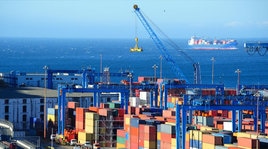
February 22, 2017
Maersk and CMA CGM have agreed to take bookings through Alibaba’s ‘One Touch’ system. This facilitates the delivery of products to customers for Chinese manufacturers who sell through Alibaba’s network of websites. Essentially, such vendors can now book container space directly on Maersk or CMA CGM vessels. The ‘One Touch’ system can, according to Alibaba, also handle “customs clearance preparations and assistance in foreign exchange collections”, although this appears to stop-short of a full door-to-door freight forwarding service.
Alibaba’s original business was not e-retailing, which is handled through its TaoBao subsidiary, but connecting small Chinese manufacturers with retailers or OEMs in the West. Consequently, freight transport outside China has always been very important to Alibaba, its clients and their customers. Yet until now they have had to rely on freight forwarders to organise the delivery of products outside China.
Alibaba has a long standing interest in logistics. It has moved to construct a physical logistics network within China although this has proved to be a struggle. In this case Alibaba was motivated by the variable quality of China’s express and ‘last-mile’ sector. However, the provision of freight forwarding for both air and sea out of China is distinctly different and far broader. Although there is a vibrant sector of small, local freight forwarders, this is complemented by large western forwarders and integrators, notably UPS, DHL and FedEx.
With its latest move it is unclear if Alibaba is moving into the freight forwarding space or simply looking to sell container shipping services in the same manner in which it sells other services and products on its B2B site. If it is the former it would present freight forwarders both large and small with a powerful new competitor of similar dimension to Amazon, at least in the Chinese market.
Source: Transport Intelligence, February 21, 2017
Maersk and CMA CGM have agreed to take bookings through Alibaba’s ‘One Touch’ system. This facilitates the delivery of products to customers for Chinese manufacturers who sell through Alibaba’s network of websites. Essentially, such vendors can now book container space directly on Maersk or CMA CGM vessels. The ‘One Touch’ system can, according to Alibaba, also handle “customs clearance preparations and assistance in foreign exchange collections”, although this appears to stop-short of a full door-to-door freight forwarding service.
Alibaba’s original business was not e-retailing, which is handled through its TaoBao subsidiary, but connecting small Chinese manufacturers with retailers or OEMs in the West. Consequently, freight transport outside China has always been very important to Alibaba, its clients and their customers. Yet until now they have had to rely on freight forwarders to organise the delivery of products outside China.
Alibaba has a long standing interest in logistics. It has moved to construct a physical logistics network within China although this has proved to be a struggle. In this case Alibaba was motivated by the variable quality of China’s express and ‘last-mile’ sector. However, the provision of freight forwarding for both air and sea out of China is distinctly different and far broader. Although there is a vibrant sector of small, local freight forwarders, this is complemented by large western forwarders and integrators, notably UPS, DHL and FedEx.
With its latest move it is unclear if Alibaba is moving into the freight forwarding space or simply looking to sell container shipping services in the same manner in which it sells other services and products on its B2B site. If it is the former it would present freight forwarders both large and small with a powerful new competitor of similar dimension to Amazon, at least in the Chinese market.
Source: Transport Intelligence, February 21, 2017
Drone delivery revisited: what are the barriers to adoption?
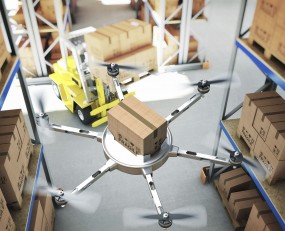
January 24, 2017
Towards the end of 2015, I asked: “What does it mean when companies announce they are ‘testing drone delivery’?”. In today’s post,
I look at what has changed since then, and which obstacles still stand in the way of drone delivery.
Firstly, the good news.
National regulators have adopted more definitive legal stances regarding drone technology, and some, such as the UK’s Civil Aviation Authority (CAA), have adapted such rules with the explicit intention of allowing companies to experiment.
This has allowed the companies engaging with drone technology to more accurately test their operation against commercially applicable conditions, which was highlighted in December by both Amazon and DPD.
In addition, Australian start-up company Flirtey has demonstrated the viability of autonomous delivery as part of a partnership with 7-Eleven. This illustrates that (expensive) human pilots, though almost certainly required as a back-up option, are not necessary for the successful execution of deliveries, thus reducing costs.
Nonetheless, it is important to note that the core limitations regarding drone-based delivery systems have not changed significantly. These are:
Lithium-ion batteries are the most effective batteries available to power drone systems, as a result of their life, but also their manufacturing economics, which is crucial. However, they have several issues, as documented by the problems Samsung experienced with its Note 7 phone. In sum, the list of problems includes leakage, poor chemical stability, flammability and limited operating voltage.
Of the delivery drones currently being trialled by Amazon, DPD (produced by Atechsys), Flirtey and Matternet (all of which are powered by Lithium-ion batteries), none have a top range of more than 20 miles. The maximum payload amongst them is around 3kg, though this is less of an issue (86% of Amazon’s packages weigh less than 2.27kg). By contrast, China’s JD.com has started trialling deliveries to rural areas using a much bigger drone, with a payload capacity of 15kg and delivery range of up to 31 miles, however this drone uses a petrol engine.
Though it is clear that the most commercially applicable deployment for drone technology is in areas with relatively low population density, the limits of power supply curtails its deployment. At present, the most obvious way around this is to install a network of drone stations for the secure fuelling and housing of delivery drones, a solution which has been explored by DPD.
Whilst this situation prevails, the most practical solution may be a concept unveiled by Mercedes-Benz in September 2016. In partnership with California start-up Matternet, whose drones are currently being tested by Swiss Post, among others, the automotive manufacturer has unveiled a ‘Vision Van’ which acts as a mobile launch unit for a pair of drones. Though carrying capacity is a concern, this solution may be viable, particularly if existing vans can be retro-fitted to accommodate drones.
In a moonshot effort to take the mobile delivery hub concept to its logical conclusion, December saw Amazon file a patent for an airborne fulfilment centre, essentially an airship with an underslung product compartment, which would dispatch drones from above. Amazon is notorious for experimenting with unusual ideas, so this should not be viewed as a definitive plan. Nonetheless, the company’s efforts underscore much of the buzz still surrounding drone technology; seemingly, anything is possible!
If this brief has been of interest, you might also like to download Ti’s analysis and market overview of the global e-commerce logistics industry. The report contains Ti’s bespoke market size and forecasting data, as well as overviews of some of the world’s leading e-commerce businesses, such as Alibaba and Amazon. In addition, the report includes company profiles of both post offices, LSPs and dedicated e-commerce solution providers to showcase the different strategies shaping the market we know today.
Source: Transport Intelligence, January 24th , 2017
Towards the end of 2015, I asked: “What does it mean when companies announce they are ‘testing drone delivery’?”. In today’s post,
I look at what has changed since then, and which obstacles still stand in the way of drone delivery.
Firstly, the good news.
National regulators have adopted more definitive legal stances regarding drone technology, and some, such as the UK’s Civil Aviation Authority (CAA), have adapted such rules with the explicit intention of allowing companies to experiment.
This has allowed the companies engaging with drone technology to more accurately test their operation against commercially applicable conditions, which was highlighted in December by both Amazon and DPD.
In addition, Australian start-up company Flirtey has demonstrated the viability of autonomous delivery as part of a partnership with 7-Eleven. This illustrates that (expensive) human pilots, though almost certainly required as a back-up option, are not necessary for the successful execution of deliveries, thus reducing costs.
Nonetheless, it is important to note that the core limitations regarding drone-based delivery systems have not changed significantly. These are:
- Physical and virtual attacks represent a threat
- There are restrictions on the size of commercial drones, and therefore their payload
- Drone systems have a short range.
Lithium-ion batteries are the most effective batteries available to power drone systems, as a result of their life, but also their manufacturing economics, which is crucial. However, they have several issues, as documented by the problems Samsung experienced with its Note 7 phone. In sum, the list of problems includes leakage, poor chemical stability, flammability and limited operating voltage.
Of the delivery drones currently being trialled by Amazon, DPD (produced by Atechsys), Flirtey and Matternet (all of which are powered by Lithium-ion batteries), none have a top range of more than 20 miles. The maximum payload amongst them is around 3kg, though this is less of an issue (86% of Amazon’s packages weigh less than 2.27kg). By contrast, China’s JD.com has started trialling deliveries to rural areas using a much bigger drone, with a payload capacity of 15kg and delivery range of up to 31 miles, however this drone uses a petrol engine.
Though it is clear that the most commercially applicable deployment for drone technology is in areas with relatively low population density, the limits of power supply curtails its deployment. At present, the most obvious way around this is to install a network of drone stations for the secure fuelling and housing of delivery drones, a solution which has been explored by DPD.
Whilst this situation prevails, the most practical solution may be a concept unveiled by Mercedes-Benz in September 2016. In partnership with California start-up Matternet, whose drones are currently being tested by Swiss Post, among others, the automotive manufacturer has unveiled a ‘Vision Van’ which acts as a mobile launch unit for a pair of drones. Though carrying capacity is a concern, this solution may be viable, particularly if existing vans can be retro-fitted to accommodate drones.
In a moonshot effort to take the mobile delivery hub concept to its logical conclusion, December saw Amazon file a patent for an airborne fulfilment centre, essentially an airship with an underslung product compartment, which would dispatch drones from above. Amazon is notorious for experimenting with unusual ideas, so this should not be viewed as a definitive plan. Nonetheless, the company’s efforts underscore much of the buzz still surrounding drone technology; seemingly, anything is possible!
If this brief has been of interest, you might also like to download Ti’s analysis and market overview of the global e-commerce logistics industry. The report contains Ti’s bespoke market size and forecasting data, as well as overviews of some of the world’s leading e-commerce businesses, such as Alibaba and Amazon. In addition, the report includes company profiles of both post offices, LSPs and dedicated e-commerce solution providers to showcase the different strategies shaping the market we know today.
Source: Transport Intelligence, January 24th , 2017
Why Retailers Stop Selling Online: The Hidden Cost of E-Commerce
Free delivery and returns are unsustainable for many entrepreneurs, who are turning away from offering online shopping

As the fastest growing retail market in Europe and North America, e-commerce is seen by many as essential for business success. At Christmas in particular, 73% of UK consumers will buy gifts online – that amounted to £24.4bn in 2015.
For many small businesses, e-commerce has allowed them to explore new markets and enabled significant growth. But for some, online trading hasn’t been plain sailing.
Earlier this year, research from Barclaycard revealed that six in 10 retailers were negatively affected by the growing number of people returning items after buying online. Online-only businesses were hit the hardest, with 31% saying that managing returns was affecting their profit margins. One in five businesses admitted to upping their prices to cover the cost of returns.
Thursday 15 December 2016 07.15 GMT Reported by the Guardian
Read full article
For many small businesses, e-commerce has allowed them to explore new markets and enabled significant growth. But for some, online trading hasn’t been plain sailing.
Earlier this year, research from Barclaycard revealed that six in 10 retailers were negatively affected by the growing number of people returning items after buying online. Online-only businesses were hit the hardest, with 31% saying that managing returns was affecting their profit margins. One in five businesses admitted to upping their prices to cover the cost of returns.
Thursday 15 December 2016 07.15 GMT Reported by the Guardian
Read full article
EESC says Europe needs to do better for consumers on Geo-blocking, Roaming & Parcel delivery
Last month, the European Economic and Social Committee (EESC) said that the EU has not delivered on its promise to abolish obstacles to the free movement of goods and services for consumers. More specifically, the EESC has delivered three key opinions on geo-blocking, roaming and parcel delivery – and concluded that Europe “can do better” in completing the single market in services for consumers.
First, the EESC believes that the European Commission’s proposal to tackle unjustified geo-blocking is only “a small step forward, not a game changer” that is uncertain to alleviate consumers’ and companies’ frustrations. The EESC recommends creating a level-playing field for online and offline trading by removing obstacles to selling and buying across borders.
Second, regarding roaming, the EESC says that consumers could face an increase in domestic prices to compensate for drop in revenues. The EESC advocates preemptive measures and increased transparency in domestic charges. In the event of a dispute between operators about the wholesale roaming markets, the EESC would welcome the Commission’s proposal to oblige national regulatory authorities to seek the opinion of BEREC, the Body of European Regulators for Electronic Communications.
First, the EESC believes that the European Commission’s proposal to tackle unjustified geo-blocking is only “a small step forward, not a game changer” that is uncertain to alleviate consumers’ and companies’ frustrations. The EESC recommends creating a level-playing field for online and offline trading by removing obstacles to selling and buying across borders.
Second, regarding roaming, the EESC says that consumers could face an increase in domestic prices to compensate for drop in revenues. The EESC advocates preemptive measures and increased transparency in domestic charges. In the event of a dispute between operators about the wholesale roaming markets, the EESC would welcome the Commission’s proposal to oblige national regulatory authorities to seek the opinion of BEREC, the Body of European Regulators for Electronic Communications.
Kazakhstan to increase Silk Road container capacity by a factor of ten

Kazakhstan has signed up to increase the volume of container shipments that it processes on the new Silk Road between China and Europe from a current yearly total of 70,000 to 800,000 by the end of the decade, the Minister of Investment and Development Zhenis Kassymbek announced last week.
“All our projects, plans in logistics and the transport field fully correlate and correspond with the Silk Road Economic Belt programme and create favourable conditions on developing transcontinental international corridors,” he said. The motorway between Almaty and Shu was being expanded to deal with an increase in road haulage and a new ferry terminal at Kuryk was already under construction, he added.
Kazakhstan will focus on transit containerisation with the 129.8-ha Khorgos Gateway multimodal dry port key to its capacity to tranship cargo from China’s and Kazakhstan’s different sized rail gauges and to load and unload trucks into container trains.
Eurasian Business Briefing
“All our projects, plans in logistics and the transport field fully correlate and correspond with the Silk Road Economic Belt programme and create favourable conditions on developing transcontinental international corridors,” he said. The motorway between Almaty and Shu was being expanded to deal with an increase in road haulage and a new ferry terminal at Kuryk was already under construction, he added.
Kazakhstan will focus on transit containerisation with the 129.8-ha Khorgos Gateway multimodal dry port key to its capacity to tranship cargo from China’s and Kazakhstan’s different sized rail gauges and to load and unload trucks into container trains.
Eurasian Business Briefing
Deutsche Bahn agrees to test drive new South West transport corridor to Iran

utsche Bahn, one of the world’s largest transport companies, has agreed to test drive the new South West Transport Corridor linking India, Iran and other Gulf states to Europe by the end of November.At a meeting in Tehran with senior transport officials from Azerbaijan, Iran, and Georgia, the German company pledged to send a freight train pulling 41 containers to the Romania port of Constanta where its cargo will be loaded on ferries destined for Georgia on at the other end of the Black Sea.
After a further rail journey to Astara in Azerbaijan, the goods will be transported by truck to Qazvin in Iran and from there on to Tehran. The journey from Constanta to the Iranian capital is expected to take eight days with the eventual aim of cutting transport time from India to Europe down from between 30 and 40 days to 15.
Deutsche Bahn, one of the world’s largest transport companies, has agreed to test drive the new South West Transport Corridor linking India, Iran and other Gulf states to Europe by the end of November.At a meeting in Tehran with senior transport officials from Azerbaijan, Iran, and Georgia, the German company pledged to send a freight train pulling 41 containers to the Romania port of Constanta where its cargo will be loaded on ferries destined for Georgia on at the other end of the Black Sea.
The corridor is just one of a number of international transport routes aimed at linking Asia to Europe that are under development. While China’s President Xi Jinping has stolen much of the limelight with his ‘One Belt One Road’ initiative and his symbolic appropriation of the historic east-west Silk Road trade routes, several north-south projects are also under development. On completion, the South West Corridor will link up with the intermodal North-South International Transport Corridor (ITC) that is due to connect the Indian Ocean and Persian Gulf to the Caspian Sea and beyond to North and Western Europe via the Russian Federation and offer an alternative to the sea routes through the Suez Canal which is being increasingly seen as a bottleneck.
See Lediator Services Reported by Rosbalt
What will Brexit mean for the UK Supply Chain and Logistics Industry?
Will this position be enhanced or damaged by the decision taken by the British electorate in June 2016?
From conversations with a number of senior industry figures, it is evident that there is no consensus over what Brexit will mean for the UK’s supply chains or the logistics companies which serve them. Those people who voted to remain in the EU typically consider that Brexit will create more complexity and regulation in dealing with our largest trading partner. Others who voted for Brexit see an opportunity to increase trade volumes with faster growing markets in North America and parts of the developing world. Their conclusions are largely subjective, an entirely understandable state of affairs given the lack of data with which to make an informed decision.
When addressing the issue of the UK’s future role in global supply chains it would be easy to become preoccupied by trade relations. This would be ill-judged as in many respects supply chains have already left trade policy a long way behind. When supply chain managers make decisions, tariffs and non-tariff barriers are not at the forefront of their minds. Inventory levels, risk, product quality, transport availability and even ethical and environmental factors these days are significantly more important.
Global supply chains operate effectively both within and outside free trade agreements. Having said that, speed and visibility are critical and anything which threatens either would be very costly to UK industry. This could be a major risk if the frictionless trade systems which have been developed within the EU are dismantled.
Reported by Professor John Manners-Bell
Transport Intelligence Ltd, Bath
October 2016
Link to report
From conversations with a number of senior industry figures, it is evident that there is no consensus over what Brexit will mean for the UK’s supply chains or the logistics companies which serve them. Those people who voted to remain in the EU typically consider that Brexit will create more complexity and regulation in dealing with our largest trading partner. Others who voted for Brexit see an opportunity to increase trade volumes with faster growing markets in North America and parts of the developing world. Their conclusions are largely subjective, an entirely understandable state of affairs given the lack of data with which to make an informed decision.
When addressing the issue of the UK’s future role in global supply chains it would be easy to become preoccupied by trade relations. This would be ill-judged as in many respects supply chains have already left trade policy a long way behind. When supply chain managers make decisions, tariffs and non-tariff barriers are not at the forefront of their minds. Inventory levels, risk, product quality, transport availability and even ethical and environmental factors these days are significantly more important.
Global supply chains operate effectively both within and outside free trade agreements. Having said that, speed and visibility are critical and anything which threatens either would be very costly to UK industry. This could be a major risk if the frictionless trade systems which have been developed within the EU are dismantled.
Reported by Professor John Manners-Bell
Transport Intelligence Ltd, Bath
October 2016
Link to report
US company plans to take the Silk Road to reach China's markets 03/10/2016
In Oct 3, Conti International of Edison, New Jersey, signed a deal with Georgian financial firm TBC Holding to build and run a $2.5 billion port and free industrial zone in Anaklia, Georgia, designed to serve as a Black Sea hub for China to Europe.
"We're delighted to be breaking ground," Conti CEO Kurt Conti was quoted on Forbes.com. He said Anaklia will be a path "from China to Europe and (will) expand trade and investment for all of China".
The Belt and Road Initiative, or the Silk Road Economic Belt and the 21st Century Maritime Silk Road initiatives, consists of transportation infrastructure projects linking Asia and Europe; it was launched by President Xi Jinping in 2013.
Conti partnered with Georgian financial firm TBC Holding to form the Anaklia Development Consortium. The project is expected to be completed in 2020, and the government of Georgia has said it will invest $100 million in the project.
Anaklia Deep Sea Port will be constructed on nearly 1,000 acres; the depth and infrastructure of the port will provide access to Panamax and Post-Panamax (larger vessels that could be accommodated by the expansion of the Panama Canal in June) ships that cannot be served by any other port in Georgia.
After completion of the first phase, the port will feature two container terminals that will be able to receive containers from 700,000 to 800,000 TEUs (20-foot equivalent units).
On Oct 3, Conti International of Edison, New Jersey, signed a deal with Georgian financial firm TBC Holding to build and run a $2.5 billion port and free industrial zone in Anaklia, Georgia, designed to serve as a Black Sea hub for China to Europe.
"We're delighted to be breaking ground," Conti CEO Kurt Conti was quoted on Forbes.com. He said Anaklia will be a path "from China to Europe and (will) expand trade and investment for all of China".
The Belt and Road Initiative, or the Silk Road Economic Belt and the 21st Century Maritime Silk Road initiatives, consists of transportation infrastructure projects linking Asia and Europe; it was launched by President Xi Jinping in 2013.
Conti partnered with Georgian financial firm TBC Holding to form the Anaklia Development Consortium. The project is expected to be completed in 2020, and the government of Georgia has said it will invest $100 million in the project.
Anaklia Deep Sea Port will be constructed on nearly 1,000 acres; the depth and infrastructure of the port will provide access to Panamax and Post-Panamax (larger vessels that could be accommodated by the expansion of the Panama Canal in June) ships that cannot be served by any other port in Georgia.
After completion of the first phase, the port will feature two container terminals that will be able to receive containers from 700,000 to 800,000 TEUs (20-foot equivalent units).
Reported by ChinaDaily.com.cn
"We're delighted to be breaking ground," Conti CEO Kurt Conti was quoted on Forbes.com. He said Anaklia will be a path "from China to Europe and (will) expand trade and investment for all of China".
The Belt and Road Initiative, or the Silk Road Economic Belt and the 21st Century Maritime Silk Road initiatives, consists of transportation infrastructure projects linking Asia and Europe; it was launched by President Xi Jinping in 2013.
Conti partnered with Georgian financial firm TBC Holding to form the Anaklia Development Consortium. The project is expected to be completed in 2020, and the government of Georgia has said it will invest $100 million in the project.
Anaklia Deep Sea Port will be constructed on nearly 1,000 acres; the depth and infrastructure of the port will provide access to Panamax and Post-Panamax (larger vessels that could be accommodated by the expansion of the Panama Canal in June) ships that cannot be served by any other port in Georgia.
After completion of the first phase, the port will feature two container terminals that will be able to receive containers from 700,000 to 800,000 TEUs (20-foot equivalent units).
On Oct 3, Conti International of Edison, New Jersey, signed a deal with Georgian financial firm TBC Holding to build and run a $2.5 billion port and free industrial zone in Anaklia, Georgia, designed to serve as a Black Sea hub for China to Europe.
"We're delighted to be breaking ground," Conti CEO Kurt Conti was quoted on Forbes.com. He said Anaklia will be a path "from China to Europe and (will) expand trade and investment for all of China".
The Belt and Road Initiative, or the Silk Road Economic Belt and the 21st Century Maritime Silk Road initiatives, consists of transportation infrastructure projects linking Asia and Europe; it was launched by President Xi Jinping in 2013.
Conti partnered with Georgian financial firm TBC Holding to form the Anaklia Development Consortium. The project is expected to be completed in 2020, and the government of Georgia has said it will invest $100 million in the project.
Anaklia Deep Sea Port will be constructed on nearly 1,000 acres; the depth and infrastructure of the port will provide access to Panamax and Post-Panamax (larger vessels that could be accommodated by the expansion of the Panama Canal in June) ships that cannot be served by any other port in Georgia.
After completion of the first phase, the port will feature two container terminals that will be able to receive containers from 700,000 to 800,000 TEUs (20-foot equivalent units).
Reported by ChinaDaily.com.cn
FINNMETKO 2016
LEDIATOR visited in professional trade fair for the machinery industries.
Many of our current and future customer, took part in 2016 FINNMETKO trade fair in Jämsä.
Russia looks to Hyperloop to slash overland transport times while founders' fall-out threatens to derail project 25/07/2016
The possibility of slashing the overland journey time between Vladivostok and Moscow from 6 days to under 24 hours grew marginally last month after the Russian Direct Investment Fund (RDIF), the state-run organisation tasked with developing some of the country’s largest infrastructure projects, announced that it had become an investor in the ground-breaking Hyperloop One project.
The brainchild of South African-born Canadian-American business magnate, engineer and inventor and Space X founder Elon Musk, Hyperloop One envisions sending passengers on levitating pods through partially pressurized tubes at more than 700mph. Formerly called Hyperloop Technologies, Hyperloop One had raised more than $100m in initial funding from a number of international venture companies including Sherpa Ventures, Formation8 and ZhenFund before going back to market earlier this year to ask for a further $80m from a total of 137 investors including the French state-run rail company SNCF, GE Ventures and now RDIF.
“Our investment in Hyperloop One will provide access to leading technologies for the Russian market,” said RDIF General Director Kirill Dmitriev. “Together with its international partners, RDIF will support the project not only on Russian territory but also in the Middle East and Far East markets. We are now speaking to Russian Railways about the first pilot projects and hope that in the very near future we will be testing this technology in Russia.”
In recent weeks, however, deep divisions between company founders Brogan BramBrogan and Shervin Pishevar have resulted in legal action and threaten to derail the project, at least temporarily.
A group of executives lead by BramBrogan are accusing the Pishevar camp of financial mismanagement and harassment, including leaving a noose at BamBrogan’s desk as a threat. They, in turn, are accusing Brogan of erratic and hostile behaviour.
“BamBrogan had become increasingly disruptive to the company with his profane, erratic, sexist, and inebriated outbursts toward management, fellow employees, and outside consultants, including screaming in the face of a [female] coworker for no rational reason, punching a wall, and breaking a beer bottle,” according to extracts from the lawsuit leaked to CNN Money.
The brainchild of South African-born Canadian-American business magnate, engineer and inventor and Space X founder Elon Musk, Hyperloop One envisions sending passengers on levitating pods through partially pressurized tubes at more than 700mph. Formerly called Hyperloop Technologies, Hyperloop One had raised more than $100m in initial funding from a number of international venture companies including Sherpa Ventures, Formation8 and ZhenFund before going back to market earlier this year to ask for a further $80m from a total of 137 investors including the French state-run rail company SNCF, GE Ventures and now RDIF.
“Our investment in Hyperloop One will provide access to leading technologies for the Russian market,” said RDIF General Director Kirill Dmitriev. “Together with its international partners, RDIF will support the project not only on Russian territory but also in the Middle East and Far East markets. We are now speaking to Russian Railways about the first pilot projects and hope that in the very near future we will be testing this technology in Russia.”
In recent weeks, however, deep divisions between company founders Brogan BramBrogan and Shervin Pishevar have resulted in legal action and threaten to derail the project, at least temporarily.
A group of executives lead by BramBrogan are accusing the Pishevar camp of financial mismanagement and harassment, including leaving a noose at BamBrogan’s desk as a threat. They, in turn, are accusing Brogan of erratic and hostile behaviour.
“BamBrogan had become increasingly disruptive to the company with his profane, erratic, sexist, and inebriated outbursts toward management, fellow employees, and outside consultants, including screaming in the face of a [female] coworker for no rational reason, punching a wall, and breaking a beer bottle,” according to extracts from the lawsuit leaked to CNN Money.
Falling commodities and weak currencies push CIC into first loss on overseas investments since 2011 25/07/2016
Asian Times: Battered by falling commodity prices and weak currencies, China’s $814bn China Investment Corp sovereign wealth fund has reported its first loss on overseas investments in four years. While total assets climbed 9% to $813.8n last year, the net return on overseas investments fell to -2.96% from 5.47% in 2014. “Given uncertainties like the Fed’s fickleness on raising rates, Brexit and fluctuations of major currencies, 2016 is likely to be another year of sluggish growth, coupled with subdued inflation, low productivity, and lacklustre trade,” CIC’s chairman and CEO Ding Xuedong wrote in the preface to the fund’s annual report that was published on Friday.
The report reveals that approximately 47% of CIC’s 2015 global portfolio was invested in stocks, 14% in fixed income, 22% in long-term investments, 13% in absolute return, and about 3% in cash.
The report reveals that approximately 47% of CIC’s 2015 global portfolio was invested in stocks, 14% in fixed income, 22% in long-term investments, 13% in absolute return, and about 3% in cash.
Logistics security problems in Bangladesh
The unpredictable nature of supply chain risk has been illustrated by events in Bangladesh. The latest terrorist attack has unsettled foreign companies operating in, or buying from Bangladesh because of its specific targeting of outsiders. The perception is that any travel to Bangladesh is unsafe with the obvious effect that the country is thought to be becoming a much less attractive source for clothing production for western retailers. It is being reported that both H&M and Uniqlo have suspended all travel to the country although there are no reports of the cancellation of contracts.
What is possibly more serious is the effect that the threat of terrorism is having on Bangladesh’s logistics. Earlier in the year the UK and Australia placed a ban on direct air freight from Bangladesh due to concerns about airport security. This has been followed by Germany who announced a week ago that direct flights would be prohibited. Effectively air freight movements to Germany, the UK and Australia will have to rely on ‘third country screening’, that is trans-shipment through a hub where the cargo can be re-examined. This is despite Hazrat Shahjalal International Airport employing a British security company to overhaul its counter-terrorist operations.
This would not be as serious if the sea freight sector was efficient. Clothing exports rely heavily on container shipping, however Bangladesh’s container port infrastructure has not kept-up with the country’s rapid economic growth and its container terminal is unable to cope with demand. The politics around container port development has become mixed-up with strategic issues in the region, with China offering to build a new terminal to the fury of neighbouring India who are putting pressure on Bangladesh to refuse the offer.
This logistics crisis threatens the garment industry in Bangladesh. The ability of the country to offer large scale clothing production at prices lower than China has led to an economic boom with the economy growing at an average of 6% over the past decade. The political instability and the inability to get large scale infrastructure built in Bangladesh threaten this growth, illustrating the importance of stable logistics systems to countries who aspire to drive their economies forward by positioning themselves on global supply chains.
Source: Transport Inelligence, July 06, 2016
What is possibly more serious is the effect that the threat of terrorism is having on Bangladesh’s logistics. Earlier in the year the UK and Australia placed a ban on direct air freight from Bangladesh due to concerns about airport security. This has been followed by Germany who announced a week ago that direct flights would be prohibited. Effectively air freight movements to Germany, the UK and Australia will have to rely on ‘third country screening’, that is trans-shipment through a hub where the cargo can be re-examined. This is despite Hazrat Shahjalal International Airport employing a British security company to overhaul its counter-terrorist operations.
This would not be as serious if the sea freight sector was efficient. Clothing exports rely heavily on container shipping, however Bangladesh’s container port infrastructure has not kept-up with the country’s rapid economic growth and its container terminal is unable to cope with demand. The politics around container port development has become mixed-up with strategic issues in the region, with China offering to build a new terminal to the fury of neighbouring India who are putting pressure on Bangladesh to refuse the offer.
This logistics crisis threatens the garment industry in Bangladesh. The ability of the country to offer large scale clothing production at prices lower than China has led to an economic boom with the economy growing at an average of 6% over the past decade. The political instability and the inability to get large scale infrastructure built in Bangladesh threaten this growth, illustrating the importance of stable logistics systems to countries who aspire to drive their economies forward by positioning themselves on global supply chains.
Source: Transport Inelligence, July 06, 2016
Brexit and the impact on the logistics sector
One immediate impact of Brexit, correctly predicted by many analysts, is that the value of the pound has fallen (a boon for exporters, bad for importers) and that the FTSE 100 index lost ground. Further market volatility should be expected.
Overall though, it is obviously not clear what the UK’s relationship with the EU will be in future, nor the timetable for which such a relationship will be established. Perhaps the most used word in the coming weeks and months in the aftermath of Brexit will be uncertainty’.
For other impacts on the UK logistics sector, the analysis outlined in servey's done before Brexit vote still remains.
A survey by the Chartered Institute of Logistics and Transport (CILT) in April of 676 UK executives in the freight logistics industry revealed that 65% believed the supply chain, logistics and transport industry will have a better future if the UK remains in the EU. When respondents were asked if they believed their business would be in a stronger position if the UK rejected a Brexit, 58% agreed.
The Wall Street Journal has also reported that members of the UK maritime sector are concerned about the future of London’s role as a global centre of ship financing, brokering and insurance upon a withdrawal from the EU.
Elsewhere, a recent article by Journal of Commerce has suggested that trucking faces the biggest potential hit if the UK leaves, given its reliance on European drivers in the midst of a driver shortage. According to the Road Haulage Association (RHA), of the 290,000 heavy vehicle drivers in the UK, some 60,000 are from the EU, mainly Poland and other East European countries.
Remaining EU nations looking forward to build up logistics HUB's in mainland of Europe, to divert Trans Atlantic and Asia volumes from UK. Most likely Global eCommerce and Freight companies, are moving they UK volumes to the other EU country. Especially if Brexit is unable to agree Norway style agreement with EU.
Overall though, it is obviously not clear what the UK’s relationship with the EU will be in future, nor the timetable for which such a relationship will be established. Perhaps the most used word in the coming weeks and months in the aftermath of Brexit will be uncertainty’.
For other impacts on the UK logistics sector, the analysis outlined in servey's done before Brexit vote still remains.
A survey by the Chartered Institute of Logistics and Transport (CILT) in April of 676 UK executives in the freight logistics industry revealed that 65% believed the supply chain, logistics and transport industry will have a better future if the UK remains in the EU. When respondents were asked if they believed their business would be in a stronger position if the UK rejected a Brexit, 58% agreed.
The Wall Street Journal has also reported that members of the UK maritime sector are concerned about the future of London’s role as a global centre of ship financing, brokering and insurance upon a withdrawal from the EU.
Elsewhere, a recent article by Journal of Commerce has suggested that trucking faces the biggest potential hit if the UK leaves, given its reliance on European drivers in the midst of a driver shortage. According to the Road Haulage Association (RHA), of the 290,000 heavy vehicle drivers in the UK, some 60,000 are from the EU, mainly Poland and other East European countries.
Remaining EU nations looking forward to build up logistics HUB's in mainland of Europe, to divert Trans Atlantic and Asia volumes from UK. Most likely Global eCommerce and Freight companies, are moving they UK volumes to the other EU country. Especially if Brexit is unable to agree Norway style agreement with EU.
Uk Online Retail Sales Growth Doubles To 15% In Q1 2016 28/04/2016
UK online retail posted strong double-digit growth in the first quarter of 2016 with sales rising by 15% year-on-year, boosted by strong online sales in March and an increase in average basket value, according to the British e-Commerce association IMRG. The 15% growth in Q1 2016 nearly doubles the 8% growth during the first quarter of 2015 which was the first time when the IMRG Capgemini e-Retail Sales Index recorded a full quarter of single-digit growth. The average basket value (ABV) also went up from £77 in Q1 2015 to £81 during the first three months of 2016, following a general decline last year
While Brits increasingly shop via mobile devices, the divergence between tablet and smartphone sales continued in March, as sales via smartphones surged ahead with a massive 101% increase year-on-year, compared to only 6% growth via tablets. In Q1 overall, smartphone usage grew almost nine times with 96% compared to just 11% for tablets. This can be seen as part of a wider trend in the sector.
according to the British e-Commerce association IMRG
While Brits increasingly shop via mobile devices, the divergence between tablet and smartphone sales continued in March, as sales via smartphones surged ahead with a massive 101% increase year-on-year, compared to only 6% growth via tablets. In Q1 overall, smartphone usage grew almost nine times with 96% compared to just 11% for tablets. This can be seen as part of a wider trend in the sector.
according to the British e-Commerce association IMRG
WTO Forecast Trillion-Dollar Trade Spike 12/04/2016
Despite expectations that world trade growth will remain sluggish in 2016 at 2.8%, which would be unchanged from the 2.8% increase registered in 2015, the World Trade Organisation (WTO’s) Trade Facilitation Agreement could potentially boost trade by US$1 trillion per year, according to the World Trade Organisation.Imports of developed countries should moderate in 2016, while demand for imported goods in developing Asian economies should pick up. Global trade growth should also rise to 3.6% in 2017.
Risks to this forecast are mostly on the downside, including a sharper than expected slowing of the Chinese economy, worsening financial market volatility, and exposure of countries with large foreign debts to sharp exchange rate movements.
However, despite China’s weakened position, it still remains an important trader.
Risks to this forecast are mostly on the downside, including a sharper than expected slowing of the Chinese economy, worsening financial market volatility, and exposure of countries with large foreign debts to sharp exchange rate movements.
However, despite China’s weakened position, it still remains an important trader.
Container rates slip back in February after two-month rise 12/04/2016
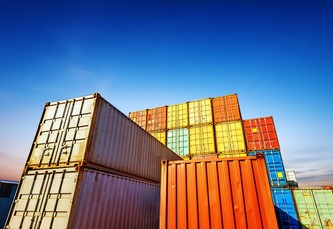
Container freight rates switched direction in February, declining after two straight months of recovery, according to figures from UK-based consultancy Container Trade Statistics (CTS).
The company’s price index, which includes both spot and contract rates, fell by one point to 70 in February, retreating to its level in November 2015 yet still two points above its low of 68 in December.
After moving within a tight band of 83–87 points from May 2013 until September 2014, the index had trended down to 74 in May 2015 before recovering to a high of 77 in September. In October, however, it suffered a six-point fall, its sharpest for a long time.
Shipping analysts have noted that the index tends to rise ahead of the Chinese New Year, which fell on 8 February in 2016.
Earlier this week, shipping analysts at DNB Markets in Oslo said a general rate increase (GRI) introduced by many lines propelled the Shanghai Containerised Freight Index (SCFI) 22.5% higher on the previous week, up to 512 points.
Yet the index was still 33% below its level at the beginning of April last year, said DNB Markets analysts Nicolay Dyvik, Oyvind Berle, and Petter Haugen in a report on 4 April.
“Implementation of the GRIs has been weak, however," they pointed out. "The Asia-Europe saw an increase of USD92/teu, which is just 16.5% of the average USD560 forecasted increase. Similarly, the Asia-North America [eastbound] saw an implementation of USD136/feu, which is just 32% of USD543 average announced increases.”
Although GRIs produce a short-lived rally each time they are introduced, substantial overcapacity is continuing to drive freight rates lower.
On 10 February, Nils Smedegaard Andersen, CEO of A.P. Moller-Maersk, the parent company of Maersk Line, forecast that demand would rise by 1–3% this year, after 0–1% growth in 2015. By contrast, the container ship fleet capacity grew by about 8% last year. The DNB Markets analysts predict demand will grow by 4.6% in 2016.
But even if demand picks up significantly, the industry would have little to celebrate. In a report on 14 March, BIMCO chief shipping analyst Peter Sand said the supply side is likely to grow by at least 7.5% in 2016, even if provisions are made for cancellations of some newbuildings, slippage of some deliveries, and higher-than-anticipated scrapping.
“BIMCO estimates take account of deliveries falling short of the scheduled orderbook by more than 40%, which is pretty much in line with what we are seeing in the markets right now. But even with this stretching of the deliveries, the challenge from the supply side remains a decisive factor for freight rates going forward,” said Sand.
The container shipping industry is largely to blame for its own difficulties. Huge vessels offer enormous economies of scale on the ship level and having lots of them has the same effect at the network and corporate level.
But BIMCO’s Sand has pointed out that, while global trade grew faster than global GDP before the financial crisis, the downturn wiped out the premium. Container shipping demand growth has therefore dropped to low single digits, down from low double-digit levels.
Container shipping is even worse placed than dry bulk, another shipping sector mired in deep troubles, in that scrapping can offer it far less assistance.
Dry bulk carriers built 15–20 years ago are of about the same size as modern ones, so scrapping an old Capesize upon the delivery of a new one would keep the supply side in balance in terms of capacity as well as vessel count. In container shipping, the largest vessels built at the turn of the millennium were of about 5,000 teu in capacity, only a quarter that of a large newbuilding entering service today.
The situation is made even more challenging by overcapacity being acutest in the very large size categories, which consist entirely of fairly new ships.
While laying them up is an option to reduce capacity, demolition sales would require a huge writeoff to cover the gap between their book value and scrap sale value.
It is highly unlikely owners would be prepared to damage their balance sheets by taking such a measure.
Reports Fairplay
The company’s price index, which includes both spot and contract rates, fell by one point to 70 in February, retreating to its level in November 2015 yet still two points above its low of 68 in December.
After moving within a tight band of 83–87 points from May 2013 until September 2014, the index had trended down to 74 in May 2015 before recovering to a high of 77 in September. In October, however, it suffered a six-point fall, its sharpest for a long time.
Shipping analysts have noted that the index tends to rise ahead of the Chinese New Year, which fell on 8 February in 2016.
Earlier this week, shipping analysts at DNB Markets in Oslo said a general rate increase (GRI) introduced by many lines propelled the Shanghai Containerised Freight Index (SCFI) 22.5% higher on the previous week, up to 512 points.
Yet the index was still 33% below its level at the beginning of April last year, said DNB Markets analysts Nicolay Dyvik, Oyvind Berle, and Petter Haugen in a report on 4 April.
“Implementation of the GRIs has been weak, however," they pointed out. "The Asia-Europe saw an increase of USD92/teu, which is just 16.5% of the average USD560 forecasted increase. Similarly, the Asia-North America [eastbound] saw an implementation of USD136/feu, which is just 32% of USD543 average announced increases.”
Although GRIs produce a short-lived rally each time they are introduced, substantial overcapacity is continuing to drive freight rates lower.
On 10 February, Nils Smedegaard Andersen, CEO of A.P. Moller-Maersk, the parent company of Maersk Line, forecast that demand would rise by 1–3% this year, after 0–1% growth in 2015. By contrast, the container ship fleet capacity grew by about 8% last year. The DNB Markets analysts predict demand will grow by 4.6% in 2016.
But even if demand picks up significantly, the industry would have little to celebrate. In a report on 14 March, BIMCO chief shipping analyst Peter Sand said the supply side is likely to grow by at least 7.5% in 2016, even if provisions are made for cancellations of some newbuildings, slippage of some deliveries, and higher-than-anticipated scrapping.
“BIMCO estimates take account of deliveries falling short of the scheduled orderbook by more than 40%, which is pretty much in line with what we are seeing in the markets right now. But even with this stretching of the deliveries, the challenge from the supply side remains a decisive factor for freight rates going forward,” said Sand.
The container shipping industry is largely to blame for its own difficulties. Huge vessels offer enormous economies of scale on the ship level and having lots of them has the same effect at the network and corporate level.
But BIMCO’s Sand has pointed out that, while global trade grew faster than global GDP before the financial crisis, the downturn wiped out the premium. Container shipping demand growth has therefore dropped to low single digits, down from low double-digit levels.
Container shipping is even worse placed than dry bulk, another shipping sector mired in deep troubles, in that scrapping can offer it far less assistance.
Dry bulk carriers built 15–20 years ago are of about the same size as modern ones, so scrapping an old Capesize upon the delivery of a new one would keep the supply side in balance in terms of capacity as well as vessel count. In container shipping, the largest vessels built at the turn of the millennium were of about 5,000 teu in capacity, only a quarter that of a large newbuilding entering service today.
The situation is made even more challenging by overcapacity being acutest in the very large size categories, which consist entirely of fairly new ships.
While laying them up is an option to reduce capacity, demolition sales would require a huge writeoff to cover the gap between their book value and scrap sale value.
It is highly unlikely owners would be prepared to damage their balance sheets by taking such a measure.
Reports Fairplay
China proposes relocating 12 key enterprises to Russia's Far East as migrant numbers swell 07/04/2016
China is set to move a number of enterprises operating in 12 key sectors to the Russian Far East, Russia’s Ministry for Far East Development announced earlier this week. The sectors concerned include metallurgy, power engineering, machinery, shipbuilding, the chemical, textile and cement industries, telecommunications and agriculture. The idea was discussed during a recent visit to Beijing by Far East Minister Alexandr Galushka.
The Chinese proposal has been received warmly by the Ministry and is the latest step in Russia’s attempts to realign itself eastward since relations with the West began deteriorating after its annexation of Crimea. According to Russia’s Sputnik news agency, Chinese firms have invested more than $1.9bn in Russia’s Far East development projects in the past two years and a further 31 agreements worth a total of $2.6bn have also been signed by the Russian Far East Development Corporation.
The Chinese proposal has been received warmly by the Ministry and is the latest step in Russia’s attempts to realign itself eastward since relations with the West began deteriorating after its annexation of Crimea. According to Russia’s Sputnik news agency, Chinese firms have invested more than $1.9bn in Russia’s Far East development projects in the past two years and a further 31 agreements worth a total of $2.6bn have also been signed by the Russian Far East Development Corporation.
Kazakhstan to invest $20bn on new Silk Road land route
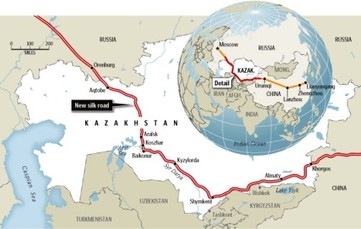
Silk Road: Kazakhstan is planning to invest more than $20bn on its transport sector over the next five years in a bid to become the main transit country between China and Europe on the new Silk Road, its Deputy Minister of Investment and Development Zhenis Kasymbek told RIA-Novosti last week. “The new economic policy of Kazakhstan prioritises the development of transport infrastructure and logistics,” he said. “In 2014,the government invested more than $2.5bn, and between 2015 and 2017 it will allocate a further $3bn each year from the National Fund. Overall, we plan to invest over $20bn by 2020.”
The volume of trade between China and Europe is expected top 170m tons by then and, while majority of that trade has historically been shipped by sea Kazakhstan wants to promote land transportation across its territory.
AKIpress
The volume of trade between China and Europe is expected top 170m tons by then and, while majority of that trade has historically been shipped by sea Kazakhstan wants to promote land transportation across its territory.
AKIpress
Alert to forwarders of high financial risks of accepting 'freehand' shipments for a small fee
Freight forwarders have been warned about potentially huge financial losses and penalties if they continue to be attracted to handling what has become known as “freehand” or “free hand” container shipments.
WCA, told The Loadstar that in they organisation – a network of around 6,000 independent freight forwarders – had seen a growing number of cases where receiving forwarders had been left with enormous liabilities after a shipper or consignee, whose name was not on the documentation, had abandoned a shipment.
And the WCA network’s customer service department often sees trends that are a microcosm of wider issues affecting the freight forwarding industry.
In the case of freehand shipments, these tend to be CIF or FOB containers where for a small fee – typically $25-50 per shipment – the agent in the destination country will take control of the paperwork at the discharge port for the cargo to be released to the consignee. However, if the consignee, for whatever reason, abandons the shipment the forwarder can be left with disproportionate liabilities. “The receiving agent will normally earn a $25-50 handover fee for controlling the documentation, but it is their name on the master bill of lading [B/L] and so are liabilities,” WCA said.
WCA, told The Loadstar that in they organisation – a network of around 6,000 independent freight forwarders – had seen a growing number of cases where receiving forwarders had been left with enormous liabilities after a shipper or consignee, whose name was not on the documentation, had abandoned a shipment.
And the WCA network’s customer service department often sees trends that are a microcosm of wider issues affecting the freight forwarding industry.
In the case of freehand shipments, these tend to be CIF or FOB containers where for a small fee – typically $25-50 per shipment – the agent in the destination country will take control of the paperwork at the discharge port for the cargo to be released to the consignee. However, if the consignee, for whatever reason, abandons the shipment the forwarder can be left with disproportionate liabilities. “The receiving agent will normally earn a $25-50 handover fee for controlling the documentation, but it is their name on the master bill of lading [B/L] and so are liabilities,” WCA said.
Launch of the Agility Emerging Markets Logistics Index 2016
Key Findings
- India has replaced China as the emerging market with the most growth potential
- Economic shocks have replaced natural disasters and corruption as the top risk in Asia Pacific
- Following international talks to curtail its nuclear plans, Iran holds significant potential as a logistics market and moved up 12 spots in the Index from 27 to 15.
- Countries in Latin America are losing ground to other emerging markets as a result of recession, political turmoil and a fall in commodity export prices
- Oil prices and China’s economy are the leading risks to the global economy in 2016
- Sub-Saharan Africa remains a frontier market with just 21.2% of respondents saying they have operations there Consumer spending has replaced growth in energy and mineral sectors as the key driver of growth in Africa
5 megatrends to transform supply chains
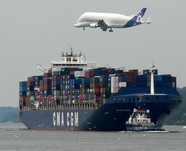
Supply chain strategies are being readapted continuously to new realities.
Five megatrends have been identified by the PwC that are emerging and will
continue to shape the business landscape over the coming decades, each
influencing the way in which organisations will set up and run their supply chains:
Source: PwC, raconteur.net
Five megatrends have been identified by the PwC that are emerging and will
continue to shape the business landscape over the coming decades, each
influencing the way in which organisations will set up and run their supply chains:
- Shift in global economic power: By 2030, the size of the seven leading emerging economies will overtake that of the current 7 largest economies.
- Demographic and social change: By 2025, the world’s population will have risen by 1b, taking the total to 8b.
- Technological breakthroughs: Around 80% of chief executives class technology as one of the top three trends that will transform their business over the next five years.
- Climate change and resource scarcity: As the world becomes more populous, urbanised and prosperous, demand for energy, food and water will rise. An increase of 35% is expected in global food demand by 2030.
- Rapid urbanisation: The global urban population is growing by 1.5m people every week and by 2025 it is expected that there will be 37 megacities, up from 23 in 2015.
Source: PwC, raconteur.net
Are You Prepared For The Digital Imperative?

As entire industries are disrupted by bold digital entrants and business models, more and more companies are at risk of extinction.
Music, retailing, media, and travel are far along on this path, but we are also seeing similar patterns in more traditional industries, such as banking, agriculture, energy, health care, industrial goods, transportation, and manufacturing.
Digital strategy and transformation must therefore be a top priority of the CEO and the senior management team.
Companies can’t just dabble at the edges by appointing a charismatic chief digital officer or CIO, adopting the latest shiny technologies, or “letting a thousand flowers bloom.”
Key focus areas for CEO:
1. Prototype Your Strategy
2. Disrupt Your Business (Before Others Do)
3. Digitize the Core Business
4. Create Value from Data
5. Position Your Business in the Broader Ecosystem
Read More
January 19, 2016
Music, retailing, media, and travel are far along on this path, but we are also seeing similar patterns in more traditional industries, such as banking, agriculture, energy, health care, industrial goods, transportation, and manufacturing.
Digital strategy and transformation must therefore be a top priority of the CEO and the senior management team.
Companies can’t just dabble at the edges by appointing a charismatic chief digital officer or CIO, adopting the latest shiny technologies, or “letting a thousand flowers bloom.”
Key focus areas for CEO:
1. Prototype Your Strategy
2. Disrupt Your Business (Before Others Do)
3. Digitize the Core Business
4. Create Value from Data
5. Position Your Business in the Broader Ecosystem
Read More
January 19, 2016
Is Europe on the road to recovery?

The headlines are not kind: “German Manufacturing orders unexpectedly collapse”; “Euro zone PMI: Pace of overall September activity slower than first thought”; and the coup de grace, “European unemployment rate stays at 9.5%.” The data coming into the final quarter of the year suggests the steady recovery in Europe is starting to slow.
This is all the more worrying given the European Central Bank’s commitment to continue buying 60 billion euros ($67.3 billion) of bonds every month in a bid to stimulate economic activity. So what has gone wrong?
It’s tempting to think that, perhaps like the fading glory of the Dowager Countess in the television series ‘Downton Abbey’, Europe’s past is more splendid than its future. That the distant sonic boom of technological triumphs like Concorde and France’s high speed TGV are nothing more than the death-rattle of a continent that is no longer globally competitive and has lived beyond its means for far too long.
This is all the more worrying given the European Central Bank’s commitment to continue buying 60 billion euros ($67.3 billion) of bonds every month in a bid to stimulate economic activity. So what has gone wrong?
It’s tempting to think that, perhaps like the fading glory of the Dowager Countess in the television series ‘Downton Abbey’, Europe’s past is more splendid than its future. That the distant sonic boom of technological triumphs like Concorde and France’s high speed TGV are nothing more than the death-rattle of a continent that is no longer globally competitive and has lived beyond its means for far too long.
BARRIERS TO IMPROVING GLOBAL SUPPLY CHAIN PERFORMANCE BY USING “BIG DATA”
An intriguing question is why similar information is not available to support the optimization of supply chains? Several reasons seem plausible:
• Many supply chain stakeholders do not really understand what value they could get from better utilizing big data. • Much of the potential value would come from sharing data, much as Waze users share data for the common good. However, companies that own the data are hesitant to share it. • Shared data requires that there be some neutral data repository that aggregates, organizes and makes the data available in some useful form. No such repository currently exists. |
THE RISING THREAT OF CYBERATTACKS TO LOGISTICS NETWORKS
Less attention has been paid, however, to the possibility of an attack on their information technology (IT) systems, which, depending on the source of the threat, could have consequences ranging from the inconvenient to the catastrophic. The risk is very real – according to the Verizon 2013 Data Breach Investigations report, 15% of those companies actively targeted were in the transportation sector.
|
Global Agenda Council on the Future of Logistics & Supply Chains 2014-2016
Supply chains are becoming increasingly essential across industries and sectors, as businesses become more globalized and manufacturing facilities and customer bases are more spread out across the world. Technological advances have also led to greater cost efficiencies and reduced transport time, but many challenges and risks remain to be resolved if firms are to meet the needs of their customers for ever- increasing speed and flexibility.
The Global Agenda Council on the Future Logistics & Supply Chains strives to raise awareness regarding the importance of supply chain strategy to both business and government. Over the two-year term, the council will explore a variety of topics meant to advance this agenda. |

